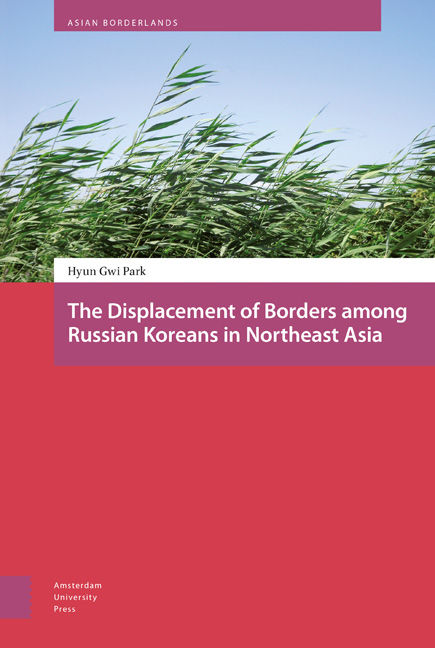Book contents
- Frontmatter
- Dedication
- Contents
- List of Maps, Figures and Tables
- Acknowledgements
- Note on transliteration, translation, and names
- Preface: Clearing the Ground
- Introduction: the Obscure Presence of Russian Koreans in Northeast Asia
- 1 The History of âthe Korean Questionâ and Border-Making in the Russian Far East
- 2 Repatriating to the Russian Far East, Confronting the Transition
- 3 Living Soviet Socialism the Korean way: Mobile Agriculture at the Border of Socialism
- 4 Greenhouse Society: the Subsistence Economy and Householding
- 5 Recalling History: Koreiskii Dom, Transnational Connections, and Diaspora Politics
- Epilogue
- Appendix 1
- Appendix 2
- Glossary
- Bibliography
- Index
3 - Living Soviet Socialism the Korean way: Mobile Agriculture at the Border of Socialism
Published online by Cambridge University Press: 12 February 2021
- Frontmatter
- Dedication
- Contents
- List of Maps, Figures and Tables
- Acknowledgements
- Note on transliteration, translation, and names
- Preface: Clearing the Ground
- Introduction: the Obscure Presence of Russian Koreans in Northeast Asia
- 1 The History of âthe Korean Questionâ and Border-Making in the Russian Far East
- 2 Repatriating to the Russian Far East, Confronting the Transition
- 3 Living Soviet Socialism the Korean way: Mobile Agriculture at the Border of Socialism
- 4 Greenhouse Society: the Subsistence Economy and Householding
- 5 Recalling History: Koreiskii Dom, Transnational Connections, and Diaspora Politics
- Epilogue
- Appendix 1
- Appendix 2
- Glossary
- Bibliography
- Index
Summary
The collective farm is the school of communism for the peasants.
Catchphrase displayed in a Siberian collective farm in Soviet times, cited in Humphrey, 1998‘Gobonji’ was, is and will continue to be, where Koreans learn and live. We should not forget that precisely this method, ‘gobonji’, appeared as a school of education and study for numbers of Korean businessmen, industrialists, bankers, and scholars in the former USSR.
Yan 2000, p. 7During my fieldwork, I noticed that Russian Koreans were constantly described as trudoliubitel’nyi or trudoliubivyi narod (both ‘hard-working people’), both by themselves and by non-Korean people. This characterization seemed to provide a concept versatile enough to explain various things, especially how Russian Koreans managed to survive despite all of the hardships caused by their sudden displacement in the 1990s. Thus, ‘hardworking’ seemed to acquire almost the status of a natsional’nyi kharakter (‘national character’) – itself which is a powerful, essentialist trope in the Soviet and Russian understanding of the nation and culture. Indeed, my interlocutors spoke to me as if this trait had passed from generation to generation, sometimes mobilizing the metaphor of krov’ (‘blood’), as in the saying ‘We Koreans are hard-working in [our] blood’. Indeed, in the early 2000s they worked long hours and it was rare to find someone who was not doing anything, unless the person was alcoholic, disabled, or ill. Thus, this attribute was presented as a strong cultural trait of the Koreans, to the extent that it was naturalized as part of the definition of a ‘normal’ Korean. In other words, ‘hard working’ was the normative criterion for one's behavior or approach to life, and was conventionally used to define average Koreans in the early 2000s.
However, this cultural norm was not formed suddenly, nor was it an innate aspect of Koreans or Korean culture. From a historical perspective, it is interesting to note that Koreans’ excessive emphasis on the ethic of hard work was replicated in two historical periods: the post-deportation period from 1937, and the post-socialist transition from 1991. It was during these two periods that the Koreans experienced massive upheavals through spatial displacement, to an extent that threatened the stable socio-economic life that they had earlier achieved.
- Type
- Chapter
- Information
- Publisher: Amsterdam University PressPrint publication year: 2017



